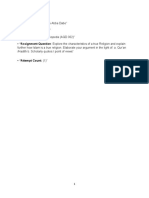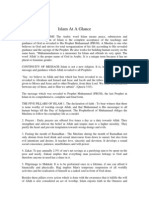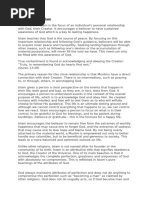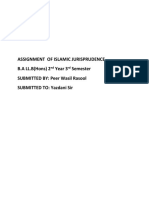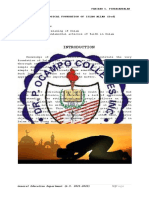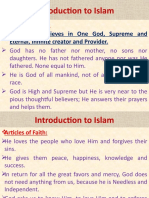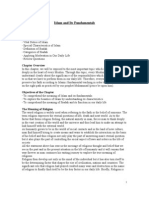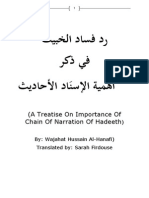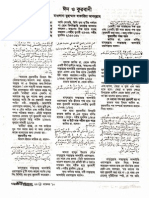Lesson 2
Lesson 2
Uploaded by
Jinraida PapandayanCopyright:
Available Formats
Lesson 2
Lesson 2
Uploaded by
Jinraida PapandayanOriginal Title
Copyright
Available Formats
Share this document
Did you find this document useful?
Is this content inappropriate?
Copyright:
Available Formats
Lesson 2
Lesson 2
Uploaded by
Jinraida PapandayanCopyright:
Available Formats
IS 1 FARIDAH S.
PINDAGANDALAN
Lesson 2 THE BASIC CONCEPTS OF ISLAM
Learning Objectives:
1. Identify the basic concepts of Islam
2. Differentiate basic concept of Islam
3. Determine the role of each basic concept of Islam
4. Practice in daily life
INTRODUCTION
Islam is the second largest religion in the world after
Christianity, with about 1.8 billion Muslims worldwide. Although
its roots go back further, scholars typically date the creation
of Islam to the 7th century, making it the youngest of the major
world religions. Islam started in Mecca, in modern-day Saudi
Arabia, during the time of the Prophet Muhammad’s life. Today,
the faith is spreading rapidly throughout the world.
Islam is a monotheistic religion. It teaches that there is only
one God who is the origin and creator of the universe. This is
the foundation of Islam, and is reflected in the famous sentence
which says that, “There is no god but Allah.” (Allah is the
Arabic name of God.)
The belief in God relates us to our origin and guides us
throughout our life. The belief in one God shows that man should
not worship any material thing or person in this universe.
By teaching that there is only One God for all humans, Islam
promotes the sense of brotherhood and equality in human society--
all are equally related to God in the same way.
The Concept of Faith (Iman)
General Education Department (S.Y. 2021-2022) 1|Page
IS 1 FARIDAH S. PINDAGANDALAN
Some people may think that man becomes a Muslim when he
confesses belief in the Oneness of the True God and in Muhammad
as His Last Messenger. But this is far from the full meaning of
Faith. The full meaning of Faith in Islam is not, by any means,
something nominal or mere formality. Faith in Islam is a state of
happiness acquired by virtue of positive action and constructive
conceptions as well as dynamic and effective measures.
The Holy Qur’ an and the Traditions of Muhammad define these
required measures and establish the standards which build up a
meaningful Faith. Thus, the true believers are:
1. Those who believe in God, His angels, His Books as completed
by the Qur’ an, His messengers with Muhammad being the Last of
them all, the Day of Final Judgement, the absolute knowledge and
wisdom of God.
2. Those who trust God always and enjoy unshakable confidence in
Him.
3. Those who spend in the way of God of what He has given them in
the form of wealth, life, health, knowledge, experience, and so
on.
4. Those who observe their daily prayers regularly as well as
the weekly and annual congregations.
5. Those who pay their religious taxes (alms or Zakah) to the
rightful beneficiaries (individuals or institutions), the minimum
of which is two and half percent of the annual “ net” income, or
of the total value of stocks if in business – after discounting
all expenses and credits.
6. Those who enjoin the right and good, and combat the wrong and
evil by all lawful means at their disposal.
7. Those who obey God and His Messenger Muhammad; and feel
increasing strength of faith when the Qur’ an is recited, and
humility of heart when God’s name is mentioned.
8. Those who love God and His Messenger most, and love their
fellow men sincerely for the sake of God alone.
9. Those who love their near and distant neighbors and show
genuine kindness to their guests, especially the strangers.
10. Those who say the truth and engage in good talk, or else
abstain.
The Concept of Righteousness (Birr)
Islam always warns against superficial concepts and
rituals, against lifeless formalities and non-effective beliefs.
In one representative verse God explains the full meaning of
righteousness as follows:
General Education Department (S.Y. 2021-2022) 2|Page
IS 1 FARIDAH S. PINDAGANDALAN
It is not righteousness that you turn your faces (in prayer)
towards East or West; but it is righteousness to believe in God
and the Last day, and the Angels and the Book, and the
Messengers; to spend of your wealth – in spite of your love for
it – for your kin, for orphans, for the needy, for the wayfarer,
for those who ask, and for the ransom of slaves; to be steadfast
in prayer and practice regular charity; to fulfill the contracts
which you have made; and to be firm and patient, in pain and
adversity and throughout all periods of panic. Such are the
people of truth, the God – minded (Qur’ an, 2:177.)
The Concept of Piety (Taqwa)
What has been said about faith and righteousness is
generally true of piety. Again, it is not a matter of convenient
claims and oral confessions. It is much more serious. As always,
the Qur’ an is our best source, and when it speaks of the pious
it describes them as those who believe in the Unseen (which is
taught by God), are steadfast in prayer, and spend of what We
have provided for them; and who believe in the Revelation sent to
you (Muhammad), and sent before your time, and (in their hearts)
have the assurance of the Hereafter. They are on true guidance
from their Lord, and it is these who will prosper (Qur’ an, 2:3-
5). The pious are those who spend (freely in the way God) whether
in prosperity or in adversity; who restrain anger and pardon (all
men; - for God loves those who do good; and those who – having
done something to be ashamed of, or wronged their own souls –
earnestly bring God into mind, and ask for forgiveness for their
sins, - and who can forgive sins except God? – and are never
obstinate in persisting knowingly in (the wrong) they have done.
For such the reward is forgiveness from their Lord, and Gardens
with rivers flowing underneath, - an eternal dwelling. How
excellent a recompense for those who work (and strive)! (Qur’ an,
3:134-136).
The Concept of Prophethood
The Merciful and loving God has sent many prophets at different
times of history. Every known nation has had one prophet or more.
All the prophets of God were men of good character and high
honor. They were prepared and chosen by God to deliver His
Message to mankind. Their honesty and truthfulness, their
intelligence and integrity are beyond doubt. They were infallible
in that they did not commit sins or violate the Law of God. But
as mortals, they might have made unintentional mistakes in some
human affairs and decisions. Their private judgment were not
necessarily always right.
General Education Department (S.Y. 2021-2022) 3|Page
IS 1 FARIDAH S. PINDAGANDALAN
The Concept of Life
Life is a brilliant demonstration of God’s wisdom and knowledge,
a vivid reflection of His art and power. He is the Giver and
Creator of life. Nothing comes to existence by chance, and nobody
creates himself or anybody else. Life is a dear and cherishable
asset, and no sensible or normal person would like to lose it by
choice. Even those who feel so desperate and take their lives by
committing slow suicide, try in the last minute to regain their
existence and wish to capture a second chance to live. Life is
given to man by God, and He is the only Rightful One to take it
back; no one else has the right to destroy a life. This is why
Islam forbids all kinds of suicide and self destruction, and
recommends patience and good Faith when a dear soul passes away.
When a murderer is executed in punishment, his life is taken away
by the right of God and in accordance with His Law.
The Concept of Religion
Throughout history religion has been abused and misunderstood.
Some people use it as a means of exploitation and suppression, as
a pretext for prejudice and persecution. Some other people use it
as a source of power and domination over the elite and the masses
alike. In the name of religion unjustifiable wars have been
launched, freedom of thought and conscience has been oppressed,
science has been persecuted, the right of the individual to
maturity has been denied, and man’s dignity and honor have been
flagrantly debased. And in the name of religion an injustice has
been inflicted upon humanity with the result that religion itself
has suffered many losses.
The Concept of Sin
One of the major troublesome areas of human existence is the
problem of sin or evil in the world. It is commonly believed that
sin started with Adam and Eve during their life in the Garden of
Eden. That event led to the Fall and has ever since branded the
human race with guilt, stigma, and bewilderment. Islam has taken
a unique position on the whole issue, a position which is not
shared by any other religion we know. The Qur’ an
states that Adam and Eve were directed by God to reside in the
Garden of Eden and enjoy its produce as they pleased, assured of
bountiful supplies and comfort. But they were warned not to
General Education Department (S.Y. 2021-2022) 4|Page
IS 1 FARIDAH S. PINDAGANDALAN
approach a particular tree so that they would not run into harm
and injustice. Then Satan intrigued them to temptation and caused
them to lose their joyful state. They were expelled from the
Garden and brought down to earth to live, die, and taken out
again at last for the Final Judgment. Having realized what they
had done, they felt shame, guilt, and remorse. They prayed for
God’s mercy and were forgiven (Qur’ an, 2:35-38; 7:19-25; 20:117-
123).
According to the moral scale of Islam, it is not a sin that
man is imperfect or fallible. This is part of his nature as a
finite limited creature. But it is a sin if he has the ways and
means of relative perfection and chooses not to seek it. A sin is
any act, thought, or will that (1) is deliberate, (2) defies the
unequivocal law of God, (3) violates the right of God or the
right of man, (4) is harmful to the soul or body, (5) is
committed repeatedly, and (6) is normally avoidable. These are
the components of sin which is not innate or hereditary. It is
true, however, that man has the potential capacity of sin latent
in him; but this is not greater than his capacity of piety and
goodness. If he chooses to actualize the potential of sin instead
of the potential of goodness, he will be adding a new external
element to his pure nature. For this added external element man
alone is responsible.
In Islam, there are major and minor sins as there are sins
against God and sins against both God and man. All sins against
God, except one, are forgivable if the sinner sincerely seeks
forgiveness. The Qur’ an has stated that truly God does not
forgive the sin of shirk (polytheism, pantheism, trinity, etc.).
But He forgives sins other than this and pardons whom He wills.
Yet if the polytheist or atheist comes back to God, his sin will
be forgiven. Sins against men are forgivable only if the offended
pardon the offender or if the proper compensations and / or
punishments are applied.
The Concept of Freedom
Freedom, both as a concept and as a value, has been denied to
many individuals, groups, and nations. It has been often
misunderstood and abused. The fact is that in no human society
can man be free in the absolute sense of the word. There must be
some limitations of one sort or another, if the society is to
function at all. Apart from this general idea, Islam teaches
freedom, cherishes it, and guarantees it for the Muslim as well
as for the non-Muslim. The Islamic concept of freedom applies to
all voluntary activities of man in all walks of life. As already
stated, every man is born free on the fitrah or in a pure state
of nature. This means that man is born free from subjugation,
sin, inherited inferiority, and ancestral hinderance. His right
General Education Department (S.Y. 2021-2022) 5|Page
IS 1 FARIDAH S. PINDAGANDALAN
of freedom is sacred as long as he does not deliberately violate
the Law of God or desecrate the rights of others.
The Concept of Equality
One basic element in the value system of Islam is the
principle of equality or, better yet, equity. This value of
equality is not to be mistaken for or confused with identicalness
or stereotype. Islam teaches that, in the sight of God, all men
are equal, but they are not necessarily identical. There are
differences of abilities, potentials, ambitions, wealth and so
on. Yet none of these differences can by itself establish a
status of superiority of one man or race to another. The stock of
man, the color of his skin, the amount of wealth he has, and the
degree of prestige he enjoys have no bearing on the character and
personality of the individual as far as God is concerned. The
only distinction which God recognizes is the distinction in
piety, and the only criterion which God applies is the criterion
of goodness and spiritual excellence. In the Qur’ an, God says:
O mankind, verily We have created you from a single (Pair) of a
male and a female, and have made you into nations and tribes,
that you may know each other. Verily the most honored of you in
the sight of God is the most righteous (49:13).
The difference of race, color, or social status are only
accidental. They do not affect the true stature of man in the
sight of God. Again, the value of equality is not simply a matter
of constitutional rights or gentlemen’ s agreement or
condescending charity. It is an article of faith which the Muslim
takes seriously and to which he must adhere sincerely. The
foundations of this Islamic value of equality are deeply rooted
in the structure of Islam. It stems from basic principles such as
the following: (1) All men are created by One and the Same
Eternal God, the Supreme Lord of all. (2) All mankind belong to
the human race and share equally in the common parentage of Adam
and Eve. (3) God is just and kind to all his creatures. He is not
partial to any race, age, or religion. The whole universe is His
dominion and all people are His creatures. (4) All people are
born equal in the sense that none brings any possession with him,
and they die equal in the sense that none brings any possession
with him, and they die equal in the sense that they take back
nothing of their worldly belongings. (5) God judges every person
on the basis of his own merits and according to his own deeds.
(6) God has conferred on man, man as such, a title of honor and
dignity.
Such are some of the principles behind the value of equality
in Islam. When this concept is fully utilized, it will leave no
place for prejudice or persecutions. And when this Divine
General Education Department (S.Y. 2021-2022) 6|Page
IS 1 FARIDAH S. PINDAGANDALAN
ordinance is fully implemented, there will be no room for
oppression or suppression. Concepts of chosen and gentile
peoples, words such as privileged and condemned races,
expressions such as social castes and second – class citizens
will all become meaningless and obsolete.
The Concept of Brotherhood
Another fundamental element in the value system of Islam is
the value of human brotherhood. This value also is founded on the
same principles which have been discussed in connection with
freedom and equality. Besides those foregoing principles, human
brotherhood in Islam is based on an unshakable belief in the
Oneness and Universality of God the worshipped, the unity of
mankind the worshippers, and the unity of religion the medium of
worship. For the Muslim, God is One, Eternal and Universal. He is
the Creator of all men, the Provider for all men, the Judge of
all men, and the Lord over all men. To Him, social status,
national supermanship, and racial origin are insignificant.
Before Him, all men are equal and brothers of one another. The
Muslim believes in the unity of mankind with regard to the source
of creation, the original parentage, and the final destiny. The
source of creation is God Himself. The original common parentage
is that of Adam and Eve. To this first parentage, every human
being belongs and of it he partakes. As for the final destiny,
there is no doubt in the Muslim’ s mind that it will be to God,
the Creator, to Whom all men shall return.
The Concept of Peace
To appreciate how Islam approaches the question of peace, one has
only to consider a few elementary facts about Islam. Peace and
Islam are derived from the same root and may be considered
synonymous. One of God's names is Peace. The concluding words of
the daily prayers of every Muslim are words of peace. The
greeting of the Muslims when they return to God is peace. The
daily salutations among the Muslims are expressions of peace. The
adjective “Muslim” means, in a sense, peaceful. Heaven in Islam
is the abode of peace. This is how fundamental and dominant the
theme of peace is in Islam. The individual who approaches God
through Islam cannot fail to be at peace with God, with himself,
and with his fellow men. Taking all these values together,
putting man in his proper place in the cosmos, and viewing life
in the Islamic perspective, men of good regain human dignity, to
achieve equality, to enjoy universal brotherhood, and to build a
lasting peace.
General Education Department (S.Y. 2021-2022) 7|Page
IS 1 FARIDAH S. PINDAGANDALAN
The Concept of Community
The word community has acquired certain connotations, some
of which are romantic and nostalgic, some derogatory and
reactionist. But since we intend to deal with the basics, we
shall confine our discussion to the most fundamental meanings of
the word community.
In one basic sense, the concept community means “ all forms
of relationship that are characterized by a high degree of
personal intimacy, emotional depth, moral is commitment, social
cohesion, and continuity in time ….. It may be found in …..
locality, religion, nation, race, occupation, or (common cause).
Its archetype ….. is the family” (Robert Nisbet, The Sociological
Tradition - New York: Basic Books, 1996, pp. 47-48) In another
basic sense, a community is a comprehensive group with two chief
characteristics: (1) it is a group within which the individual
can have most of the activities and experiences that are
important to him. (2) The group is bound together by a shared
sense of belonging and a feeling of identity (L. Broom & P.
Selznick, Sociology: A Text with Adapted Readings New York:
Harper & Rowe, 1968, p.31). The Historical master trend has been
a movement from those intimate, deep, moral relationships of
community to those impersonal, formal utilitarian relationships
of mass society. The movement has been designated by different
phases and marked by far-reaching consequences.
The Concept of Morality
The concept of morality in Islam centers around certain
basic beliefs and principles. Among these are the followings: (1)
God is the Creator and Source of all goodness, truth and beauty.
(2) Man is a responsible, dignified, and honorable agent of his
Creator. (3) God has put everything in the heavens and the earth
in the service of mankind. (4) By His Mercy and Wisdom, God does
not expect the impossible from man or hold him accountable for
anything beyond his power. Nor does God forbid man to enjoy the
good things of life. (5) Moderation, practicality, and balance
are the guarantees of high integrity and sound morality. (6) All
things are permissible in principle except what is singled out as
forbidden, which must be avoided. (7) Man’s ultimate
responsibility is to God and his highest goal is the pleasure of
his Creator.
The dimensions of morality in Islam are numerous, far-
reaching and comprehensive. The Islamic morals deal with the
relationship between man and God, man and his fellow men, man and
the other elements and creatures of the universe, man and his
innermost self. The Muslim has to guard his external behavior and
his manifest deeds, his words and his thoughts, his feelings and
intentions. In a general sense, his role is to champion what is
General Education Department (S.Y. 2021-2022) 8|Page
IS 1 FARIDAH S. PINDAGANDALAN
right and fight what is wrong, seek what is true and abandon what
is false, cherish what is beautiful and wholesome and avoid what
is indecent. Truth and virtue are his goal. Humbleness and
simplicity, courtesy and compassion, are his second nature. To
him, arrogance and vanity, harshness and indifference, are
distasteful, offensive and displeasing to God. The moral
principles of Islam are sometimes stated as positive commitments
which must be fulfilled and sometimes as negative prescriptions
which must be avoided. Whether they are stated positively or
negatively, they are designed to build in the human being a sound
mind, a peaceful soul, a strong personality, and a healthy body.
There is no doubt that these are necessary requirements of the
general welfare and prosperity of mankind. And to help man to
satisfy these requirements Islam has, among other things, laid
down the following regulations:
1. To bear witness to the Oneness of God and the
Messengership of Muhammad in a meaningful commital way;
2. To observe the daily prayers regularly;
3. To pay the religious tax which is known as alms or the
poor-due (zakah);
4. To keep the fast of the Holy Month of Ramadan;
5. To make a pilgrimage to the Holy City of Mecca at least
once in his lifetime.
The Concept of Universe
In the foreword, we briefly discussed the position of the
Muslims and the future of Islam in Western Hemisphere. In this
part, we shall discuss the position of man in the contemporary
world, the general human situation, and the Islamic concept of
the universe or world view. This will reaffirm the concepts that
have already been discussed, add some new ideas, and tie together
the various dimensions of the subject in a summary recapitulatory
fashion. The present human situation is alarming, to say the
least. It demands concern and active response on the part of all
people of good will and God – mindedness. But this does not, and
should not, lead to despair or resignation. The spirit of hope
is, and has always been, an integral part of Islam (see, e. g.,
Qur,an 12:87; 65:3) The problems and crises of modern times are
not entirely unique or peculiar. It is true that they are
difficult, complex, and agonizing. Perhaps this is even more so
now than ever before. But the difference, however, between this
age and those of yester centuries is basically a difference of
degree rather than of kind. The ever – increasing complexity of
our contemporary predicaments may be largely due to a similar,
proportionate rise in our expectations and capacities. For many
centuries and in numerous regions of the globe, the chief source
General Education Department (S.Y. 2021-2022) 9|Page
IS 1 FARIDAH S. PINDAGANDALAN
of the most difficult crises has essentially been a kind of
inflexible, exclusive, and intolerant attitude toward the
unfamiliar, the different, and the foreign. This orientation
fostered racism, elitism, bigotry, prejudice, and a whole host of
other equally distasteful attitudes.
Few people can really deny that humanity is facing an
unusual crisis. This present human crisis seems to emanate from a
serious imbalance between our external, outward, material
explorations and our internal, inward, moral gropings. Nothing is
simpler than calling for the maintenance of an equilibrium,
advocating a “middle range,” or crusading for the “ golden
means.” Yet nothing has been harder to attain. In the past,
utterances such as man cannot live by bread alone were sometimes
so distorted as to connote disregard for man’ s material welfare.
Similarly, trust in God has been misunderstood; it is often taken
to mean helpless fatalism or categorical denial of human free
will and self-realization.
General Education Department (S.Y. 2021-2022) 10 | P a g e
You might also like
- A History of Far Eastern ArtDocument536 pagesA History of Far Eastern ArtPhạm Đức Long83% (6)
- 02-Importance of Deen in Human LifeDocument6 pages02-Importance of Deen in Human LifeM Imtiaz Shahid76% (17)
- Unity Is Not UniformityDocument2 pagesUnity Is Not UniformityBashir Nuckchady100% (1)
- Lect-10-Concept of Islam-Diff BW Deen and ReligionDocument13 pagesLect-10-Concept of Islam-Diff BW Deen and Religionfahadraja78100% (3)
- Difference Between Deen and Religion MadhabDocument4 pagesDifference Between Deen and Religion MadhabM Imtiaz Shahid86% (22)
- Why Islam Is The True Religion in Light of The Quran and SunnahDocument7 pagesWhy Islam Is The True Religion in Light of The Quran and SunnahAsmau DaboNo ratings yet
- Amazon Best Sellers: Best NumerologyDocument8 pagesAmazon Best Sellers: Best Numerologytanya chopraNo ratings yet
- BOSWORTH, Clifford Edmund. The Arabs, Byzantium and Iran. Studies in Early Islamic History and Culture.Document651 pagesBOSWORTH, Clifford Edmund. The Arabs, Byzantium and Iran. Studies in Early Islamic History and Culture.Raquel Hoffmann100% (1)
- Bangon, Marawi City: Jamiatul Philippine Al-Islamia Graduate School Department Professor: DR. RAISALAM B. MAUNTEDocument4 pagesBangon, Marawi City: Jamiatul Philippine Al-Islamia Graduate School Department Professor: DR. RAISALAM B. MAUNTENabila NasserNo ratings yet
- Islamic Studies 2nd SemDocument47 pagesIslamic Studies 2nd SemhonestcheaterNo ratings yet
- Why Islam?: in Remembering God Do Hearts Find Rest." (Quran 13:28)Document30 pagesWhy Islam?: in Remembering God Do Hearts Find Rest." (Quran 13:28)Mubin BaigNo ratings yet
- Basic Concepts of IslamDocument21 pagesBasic Concepts of IslamFahad BhayoNo ratings yet
- GSP5Document16 pagesGSP5omotayoNo ratings yet
- Islam at A GlanceDocument4 pagesIslam at A Glancehttp://www.toursofpeace.com/No ratings yet
- Islam and New Wrold OrderDocument7 pagesIslam and New Wrold OrderXulfi AliNo ratings yet
- Muslim Beliefs, Practices, and ValuesDocument16 pagesMuslim Beliefs, Practices, and ValuessweetmanoNo ratings yet
- Words Words WordsDocument12 pagesWords Words WordsVr-oneNo ratings yet
- Truth and Where It Comes FromDocument2 pagesTruth and Where It Comes FromiSherifNo ratings yet
- Research ProjectDocument18 pagesResearch ProjectsohaNo ratings yet
- What Is Islam Part 3 of 4 4 enDocument3 pagesWhat Is Islam Part 3 of 4 4 enishfaq_natiqNo ratings yet
- Why IslamDocument4 pagesWhy Islamahsan tareenNo ratings yet
- Understanding Towards IslamDocument16 pagesUnderstanding Towards IslamCandilisciousNo ratings yet
- Assignment of Islamic JurisprudenceDocument20 pagesAssignment of Islamic JurisprudenceWasil RasoolNo ratings yet
- Principles of Faith (Usūl Al-Dīn) by Ayatullah Sheikh Vahid KhorasaniDocument206 pagesPrinciples of Faith (Usūl Al-Dīn) by Ayatullah Sheikh Vahid KhorasaniSa'id Haydar Al JaafariNo ratings yet
- 'Khaira Ummah' (Best People)Document5 pages'Khaira Ummah' (Best People)FAIZANWALINo ratings yet
- IStopic2 1Document18 pagesIStopic2 1Jinraida PapandayanNo ratings yet
- Living in His Wisdom: Acronym of the Word Wisdom as Revealed in ScriptureFrom EverandLiving in His Wisdom: Acronym of the Word Wisdom as Revealed in ScriptureNo ratings yet
- Topic 2 & 3 Islamic StudiesDocument11 pagesTopic 2 & 3 Islamic StudiesMuhammad Osman RiazNo ratings yet
- Lesson 1Document3 pagesLesson 1Jinraida PapandayanNo ratings yet
- What Do Muslims Believe?: The Roots and Realities of Modern IslamFrom EverandWhat Do Muslims Believe?: The Roots and Realities of Modern IslamRating: 3.5 out of 5 stars3.5/5 (11)
- Importance of Deen in Human LifeDocument4 pagesImportance of Deen in Human LifegulshanNo ratings yet
- Introduction To Islam (Articles of Faith)Document17 pagesIntroduction To Islam (Articles of Faith)Anas ParkerNo ratings yet
- ca1ef72f-410d-4e70-b419-1c7c13f0efefDocument111 pagesca1ef72f-410d-4e70-b419-1c7c13f0efefMohd AlHameliNo ratings yet
- Principles of Faith Usul Al Din PDFDocument164 pagesPrinciples of Faith Usul Al Din PDFSultanAlamNo ratings yet
- Our DawahDocument2 pagesOur DawahMeezan_LibraryNo ratings yet
- Man and The Philosophy of TestDocument0 pagesMan and The Philosophy of Testmohammedviqhas3541No ratings yet
- Family Life in IslamDocument36 pagesFamily Life in Islamফেইসবুক নেতাNo ratings yet
- Fazool EshaDocument4 pagesFazool Eshaeeshaahmed83No ratings yet
- The True Nature of HumansDocument46 pagesThe True Nature of HumansTahira BukhariNo ratings yet
- Islam at A GalanceDocument5 pagesIslam at A Galancea_mohid17No ratings yet
- Introduction:: Moral ValuesDocument8 pagesIntroduction:: Moral ValuesHamza Bilal100% (1)
- Healthy Life In Islam Based from The Holy Quran and Al-Hadith English Edition Standar VersionFrom EverandHealthy Life In Islam Based from The Holy Quran and Al-Hadith English Edition Standar VersionNo ratings yet
- 8.5.11 Ised Aqidah Minggu 2Document61 pages8.5.11 Ised Aqidah Minggu 2Fakhrul Islam JasmanNo ratings yet
- Research Project IslamicDocument18 pagesResearch Project IslamicsohaNo ratings yet
- Last Part of Mid Term NotesDocument23 pagesLast Part of Mid Term Notesahsan tareenNo ratings yet
- 01 Towards Understanding Islam - Pages 21-42Document23 pages01 Towards Understanding Islam - Pages 21-42Mohammed IshaqNo ratings yet
- A History of Muslim Philosophy Volume 1, Book 3Document569 pagesA History of Muslim Philosophy Volume 1, Book 3Altaf HussainNo ratings yet
- What Is IslamDocument5 pagesWhat Is IslamTyba314No ratings yet
- sha110Document4 pagessha110Asmin AbdulganiNo ratings yet
- Need For Religion 2015Document43 pagesNeed For Religion 2015Syed Waseem HussainNo ratings yet
- Muslim Youth and Cha Llne Ges of ModernityDocument18 pagesMuslim Youth and Cha Llne Ges of ModernityMoegamat LatiefNo ratings yet
- Islamic Faith&PracticeDocument72 pagesIslamic Faith&PracticeMuhammudNo ratings yet
- Diff Between Religion and DeenDocument7 pagesDiff Between Religion and Deenhunaiza khanNo ratings yet
- Faith & CertitudeDocument68 pagesFaith & CertitudeAhmadi MuslimNo ratings yet
- The Role of Faith Communities in Promoting Peace - FinalDocument12 pagesThe Role of Faith Communities in Promoting Peace - Finalgoraya15No ratings yet
- Islam Is The Only Truly Universal ReligionDocument4 pagesIslam Is The Only Truly Universal ReligionzouadraNo ratings yet
- Online 1 Islam and Its FundamentalsDocument15 pagesOnline 1 Islam and Its FundamentalsNazmi AzizNo ratings yet
- Modyul 12 OUTLINE EINSTEINDocument9 pagesModyul 12 OUTLINE EINSTEINsylvieeswysseyNo ratings yet
- The Theotokos and The ChurchDocument19 pagesThe Theotokos and The ChurchRintuMathunniNo ratings yet
- The Making of The Maori - Culture Invention and Its LogicDocument14 pagesThe Making of The Maori - Culture Invention and Its LogicCarola LalalaNo ratings yet
- What Happens When We PrayDocument9 pagesWhat Happens When We PrayAilen Rose SantosNo ratings yet
- Hist 1 ReviewerDocument6 pagesHist 1 ReviewerSharmane Andilum DecierdoNo ratings yet
- Permissibility of Celebrating MiladDocument4 pagesPermissibility of Celebrating Miladsheraz1212No ratings yet
- An Edge Night On The CreedDocument10 pagesAn Edge Night On The CreedJonathan Frederick Lee ChingNo ratings yet
- The Objectivity of Moral JudgmentsDocument13 pagesThe Objectivity of Moral JudgmentsALPHA HOLY GUERRERONo ratings yet
- EligibleDocument32 pagesEligiblePoorni RenuNo ratings yet
- Pathfinder Program OCT 9Document9 pagesPathfinder Program OCT 9meriamdomingo29No ratings yet
- Nik ScriptDocument8 pagesNik Scriptvivek35990No ratings yet
- 100,000 Songs of MilarepaDocument5 pages100,000 Songs of Milarepamozollis22No ratings yet
- Importance of Isnad - by Wajahat Hussain Al-Hanafi - EnglishDocument30 pagesImportance of Isnad - by Wajahat Hussain Al-Hanafi - EnglishWajahat Hussain Al-Hanafi100% (1)
- Calendar of Activities 2012-13 Institutional As of June 29 2012Document3 pagesCalendar of Activities 2012-13 Institutional As of June 29 2012Leo Martin GanaceNo ratings yet
- Daftar Pasien Rawat InapDocument18 pagesDaftar Pasien Rawat InapranggaNo ratings yet
- List of Biblical Themes For The Pre-Catechumenate No. Theme Translator REMARKDocument5 pagesList of Biblical Themes For The Pre-Catechumenate No. Theme Translator REMARKЁнатхан РаагасNo ratings yet
- Arthur Neve of Kashmir - Shepherd 2Document141 pagesArthur Neve of Kashmir - Shepherd 2RaahelNo ratings yet
- The Ideal Father by Maulana Muhammad Hanif Abdul MajidDocument200 pagesThe Ideal Father by Maulana Muhammad Hanif Abdul MajidIbrahim MazumderNo ratings yet
- The Deity of Jesus ChristDocument41 pagesThe Deity of Jesus Christpierre.king2007No ratings yet
- ReportDocument4 pagesReportattock jadeedNo ratings yet
- Yasodha GroupDocument2 pagesYasodha Groupmanoranjan prustiNo ratings yet
- Qurbani and Eid Mas'Ala (Bangla)Document2 pagesQurbani and Eid Mas'Ala (Bangla)nomanpurNo ratings yet
- Salah BookDocument38 pagesSalah BookTahira SawajNo ratings yet
- PDF On The Formation of Clergy Fathers of The Church Medieval Continuations DownloadDocument79 pagesPDF On The Formation of Clergy Fathers of The Church Medieval Continuations Downloadtoundekelyne100% (1)
- SRIJAN (Pre+Mains) Weekend Test 1 (English)Document65 pagesSRIJAN (Pre+Mains) Weekend Test 1 (English)shadabalam.alfaazNo ratings yet
- S&S Quarterly, Inc. Guilford PressDocument8 pagesS&S Quarterly, Inc. Guilford PressManNo ratings yet
- Things Fall ApartDocument23 pagesThings Fall ApartHatim100% (1)
- Evaluate The AuthorDocument2 pagesEvaluate The AuthornausheenalinizamiNo ratings yet





